Alumni Spotlight Camela Pilgrim: Thriving in the NICU
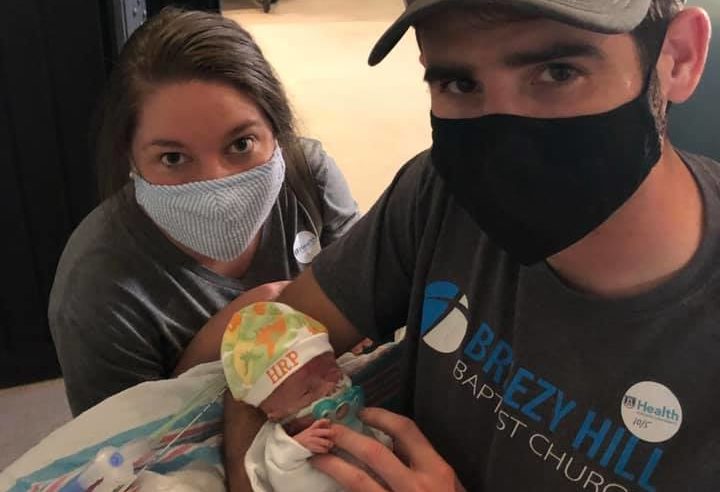
“He’s not gonna make it if he stays in there.”
These are not the positive words you expect to hear from your doctor when you are 27 weeks pregnant without any complications up to that point. But so began parenthood, early and dramatic, for Camela and Kirk Pilgrim.
Camela [Setzer] Pilgrim graduated from TBC’s Interdisciplinary program in 2012. Now living in South Carolina, Camela and her husband, Kirk, are highly involved at Breezy Hill Baptist Church, pastored by fellow TBC grad Phillip Napier (’08).
Camela says that from the beginning of their story it was clear that God was working in their lives. Various factors, including family history, made it unlikely that pregnancy would be possible, and if it did, it was expected to be a difficult and complicated pregnancy. Knowing this background, her doctor was very proactive and attentive. But both mom and baby were in perfect health at all their checkups, until that suddenly changed.
In August of 2020, Camela and Kirk Pilgrim’s baby boy, Hampton, was born prematurely at 27 weeks, weighing 1lb.1oz, and 10 inches long.
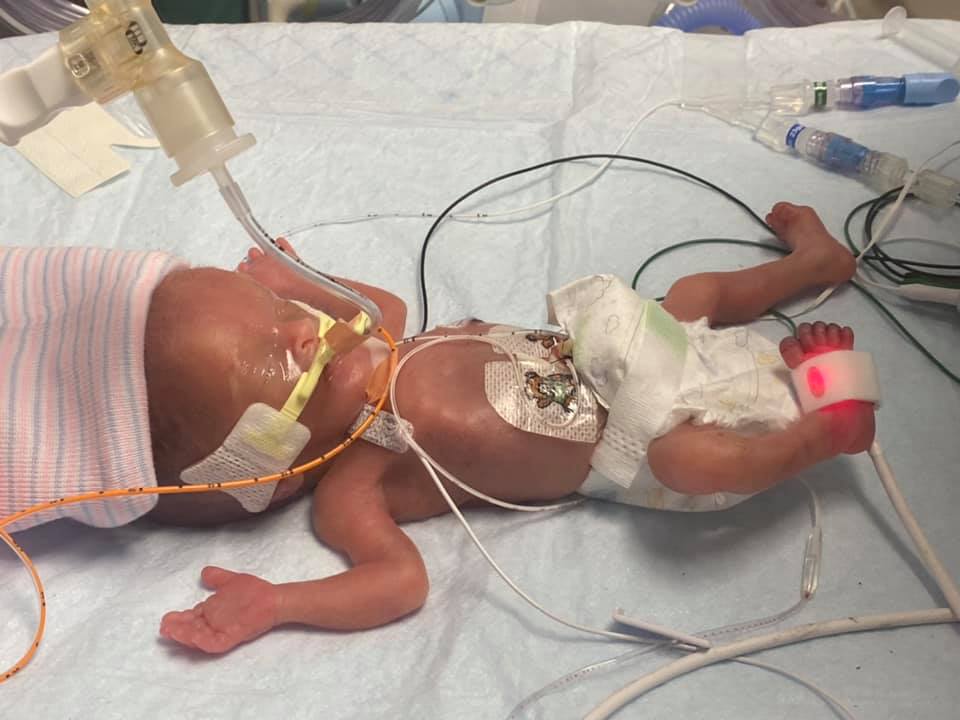
As any parent of a preemie will tell you, life in the NICU, and then going home with a child who needs special equipment, can be overwhelming. Often, well-meaning people want to help the family of the new baby, but just don’t know how. In these situations, words feel insufficient. But how does one help without invading their space?
We reached out to Camela to learn from her experience and perspective as parent of a preemie.
She was graciously willing to answer a lot of questions! We have shared her interview in a question and answer format below.
What was your first indication that this might not be a text-book pregnancy and/or birth?
Going into adulthood I already knew that pregnancy might not happen… but none of the issues we expected showed up. But when I went to my glucose test, my blood pressure was through the roof. Stroke-level high. So, of course I was admitted. The specialist came in the next day and said, “He’s not gonna make it if he stays in there”. My organs were failing and it was better for him to be out than in at that point. So, none of that was normal but it didn’t actually get crazy until he was born.
Our personalities have a lot to do with how we process things, but how did you absorb all of the information and the unknowns?
Covid made things really weird. My husband wasn’t allowed to go to any doctor appointments or the hospital with me. He could bring me clothes and then he had to leave. The day Hampton was born he was allowed to come up. Essentially I was doing all of this alone. It was probably harder for him and his parents than it was for me. I felt peace like never before. And, thankfully, I’m not a very emotional person so I wasn’t freaking out. I was like ok, this is where God has us. There wasn’t any need to think about the other things I couldn’t change. I did have some friends who both had preemies. One was in the hospital for several months and couldn’t have anyone with her at all, so that prepared me mentally, knowing that this could be so much worse. God knew exactly what we needed. So even though I was sort of alone, I never once felt alone.
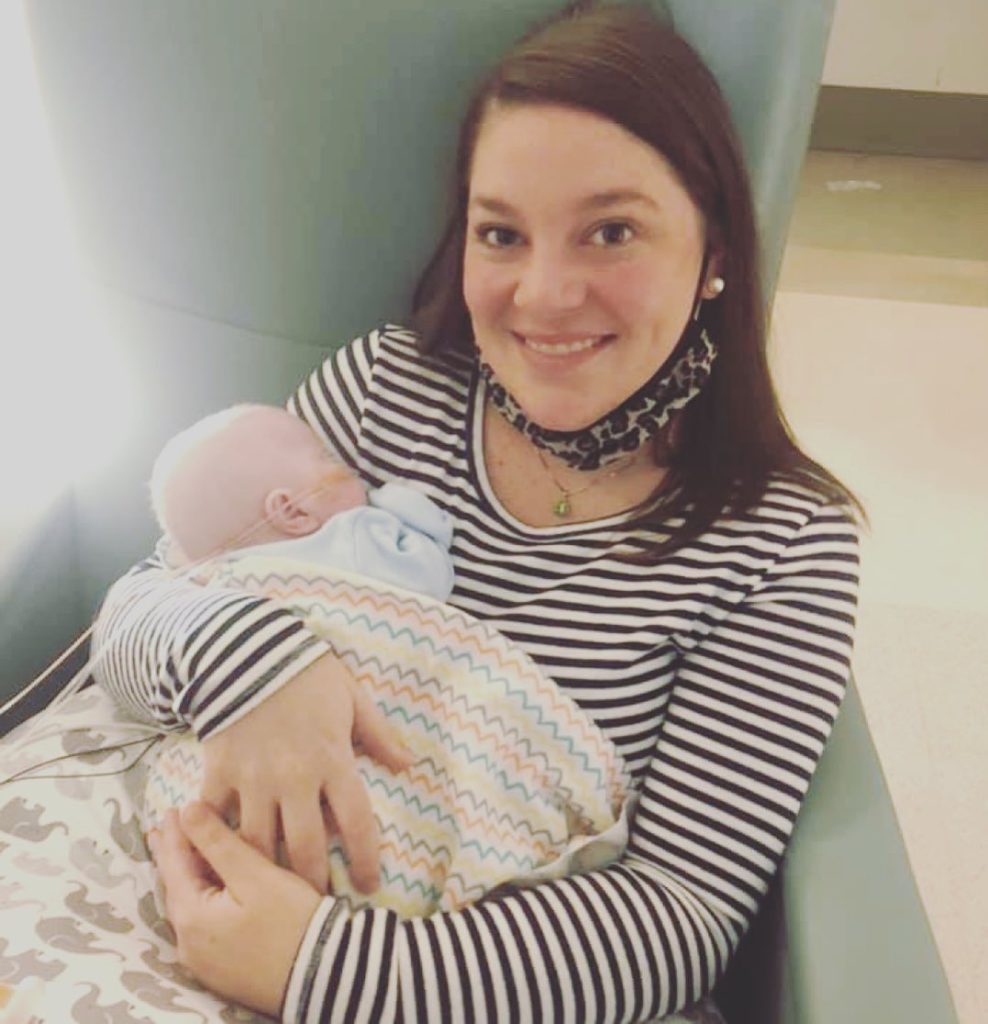
What was one of the hardest moments for you as a mom?
Hampton was born and in a level 4 NICU in a hospital. He was transferred at 4 weeks old to the children’s hospital because he needed surgeries. That was probably the hardest time; I felt like I was thriving in the NICU. We had gotten close to our nurses and doctors and loved them, so the transition was hard. But God gave us people at the new hospital as well.
You mentioned that you felt like you were “thriving” during your stay in the NICU. Could you explain a little more?
It’s not that I loved having my child there, but I felt like it was my family. For nine months we had to rely on strangers to care for our child in ways we couldn’t. There are so many people in there – not just the people with children – there are nurses, doctors, nurse practitioners… they need to see Jesus. And if we are the only Jesus that they ever see, our prayer was that we would represent Him well and make him known. There are several people that we got to know very well. We still pray for them specifically because we know that they are not saved. The whole time we were there we would pray “Lord, this is our mission field. Use us how you need to. We even prayed, “God if he isn’t going to make it and isn’t going to thrive, please go ahead and take him but let us respond gracefully.” God can use something that seems bad in our life but use it for the good of someone else as well. Our biggest desire is that we can lead others to Christ through this.
Once Hampton was able to come home, what was that like?
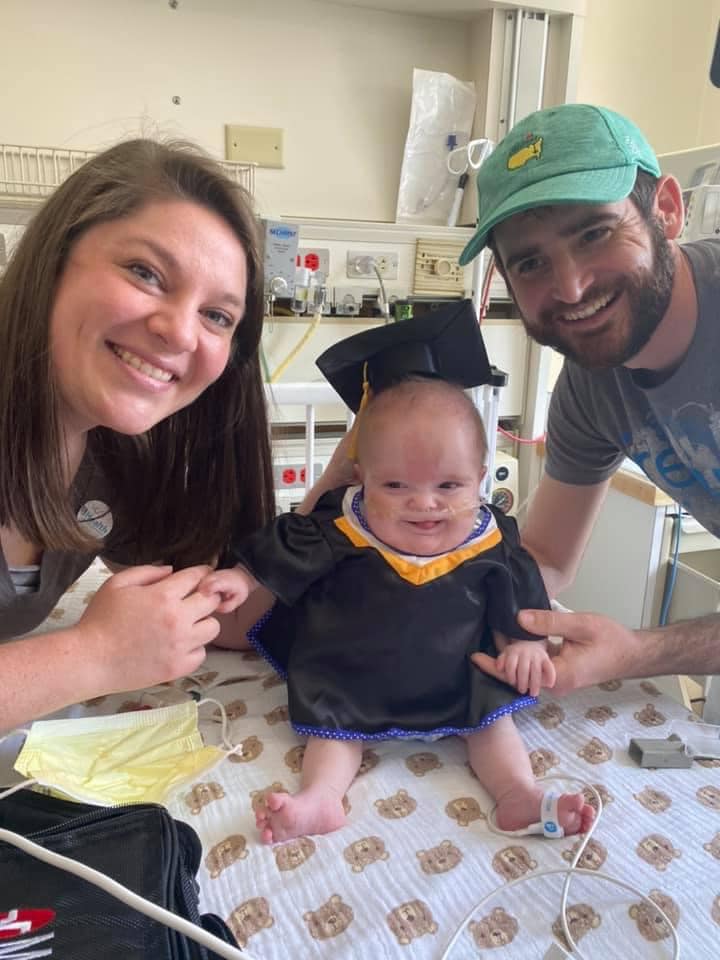
Well, he came home on oxygen, but he isn’t on that anymore. He does still have his feeding tube. When we first brought him home we felt like, “what are we doing? This is crazy!” You know, they send you home with equipment that works different from what was in the hospital. So you’re not only learning your baby, but you’re also learning the new equipment that is basically keeping him alive. So, it is all very important. But it does eventually become second nature and part of your routine.
Right now, he gets medication twice a day. It used to be more often but now it’s just twice. We usually combine those with feedings. At first, he had to be on it {the feeding tube} continuously, so he was on a pump 24 hours a day. Those days were a little more hectic because you had to make sure everything was working perfectly around the clock. Now we just feed him every 3-4 hours. He is also in speech therapy, occupational therapy, and physical therapy.
How does a feeding tube work with such a young child? Do you just stick to a schedule or look for hunger cues? And do you have any expectations on how long he will be on a feeding tube?
Feeding him is a little different because it has nothing to do with his mouth – obviously it’s not a bottle. You hook up the tube, pour the milk in, and it goes in with gravity. It sounds difficult, but I think it just takes a little more time. It’s not hard. He just doesn’t want to sit there and be still. That is the hardest part. We just try to play with toys, watch a movie, etc. Whatever is distracting. He does have hunger cues and crawls to you to eat, so there are cues but not “normal” cues because doesn’t eat anything by mouth. He is starting to taste things but it is a slow process. It may take years to come off the feeding tube or it may take months.
How has this experience changed you?
I don’t think I’m a super outgoing person – I’ll talk but I’m not one to strike up conversation. But being in the NICU for nine months, when a new family came in I felt like I needed to be the one to say like, “Hi, welcome to the NICU! It’s really not as bad as it sounds!”
Sometimes I miss it now. I was able to talk to all these people… you can walk through things together. Our family lives locally, but some families are from hours away and their kids are in the hospital. Only two people can bet there at any given time. They’re alone and sometimes we are able to take them meals. So we can bring them something and give them a call, “We have food in the waiting room whenever you’re ready.”
But one of my biggest take-aways has been to always look for the little “blessing nuggets”. When Hampton had the biggest medical events – for example, when he needed chest compressions or some other emergency came up, the nurses that knew him best were with him at the time. The blessings aren’t always easy to see, but they’re always there.
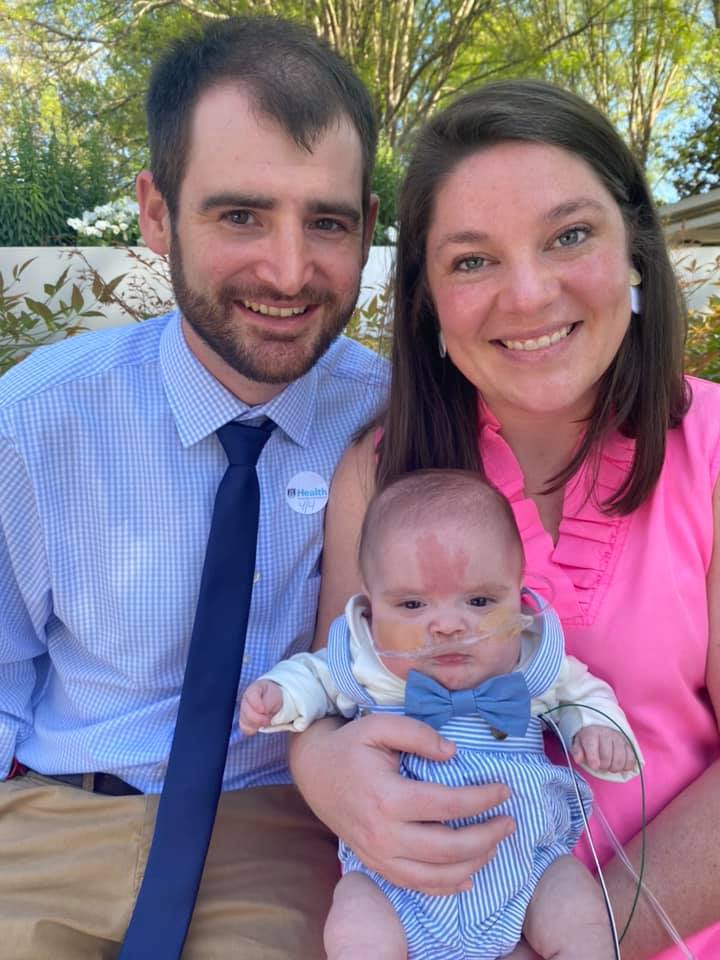
Did you know anyone with similar experiences that you could talk to and who could offer support?
Yes, someone I know reached out to me and started walking through the first few months with me. If I ever had questions, I could contact her. Another TBC alumnus reached out because she has a child with special needs and understood some of what was going on. Parents of special needs children tend to be drawn to each other even though there are different reasons and degrees of issues.
What has been an unexpected positive that has come from this experience?
There are people we know now who we never would have met otherwise, and we get to walk this weird journey together. Some of them are Christians, so we are able to encourage each other and that is a unique blessing. Even people in our church have given money and said, “If you know of a need in the NICU please give it to them and let it be a blessing”. And so, it has become a bigger picture than just our baby.
Every preemie has a different story, different complications, different outcome, and different support system. But if you could dispel one misconception about parents of special needs children, what would that be?
We don’t have it all together – none of us do. Our struggles aren’t the same as yours, but we still have them. Everybody is different. I think that is something that we all have to remember. Even preemies aren’t all the same. It is a unique culture that people don’t know about because we don’t share it or they don’t know anyone in that situation.
Knowing what to do or say to someone who is walking a difficult road is often the biggest obstacle to people reaching out. What are some ways that friends, churches, and even family can help?
When people are in any kind of season when they need help, most of the time they aren’t going to ask for help. Say specific things like, “I’m coming over to mow your grass – when is the best time for you?” or “When does your trash get picked up, I can handle that for you this week.” Or “I’m bringing you food, pick a day”. Use statements instead of asking, “can I do something?”.
God has used both people I knew and didn’t know to be a blessing. People who asked how to pray that day, or asked “How is Hampton today?” Sometimes it feels like a blanket statement when you just say “I’m praying.” But when you ask for specifics, it feels more real.
Obviously, gift cards for food and groceries, and things like that were blessings even when we didn’t know what we needed. We didn’t know if we were going to bring a baby home at the end of this or not. We were just focusing on becoming nurses basically. We have a huge family support system, and our church is super supportive too. But it was the small things that meant the most. Be intentional and specific – most people just aren’t going to ask.
Final notes:
Hampton has had his ups and downs, but Camela and Kirk Pilgrim have felt God’s grace in their lives. It is amazing to see how much Hampton has grown and progressed since August of 2020. He has a fan base on his parents’ social media, and every milestone is celebrated by hundreds.
Camela says that more than anything, she wants Hampton’s story to bring glory to God and draw others to Him. And in the past year and a half she has seen that prayer be answered as her family comes in contact with others who find themselves in the NICU or raising a child with special needs.
“When I really think about it – wow, people are watching us! We need to live who we say we are. Working at a church I don’t always have opportunities to show my faith. I don’t know how people do something like this without Christ. I have no doubt that is what made the difference for me.”
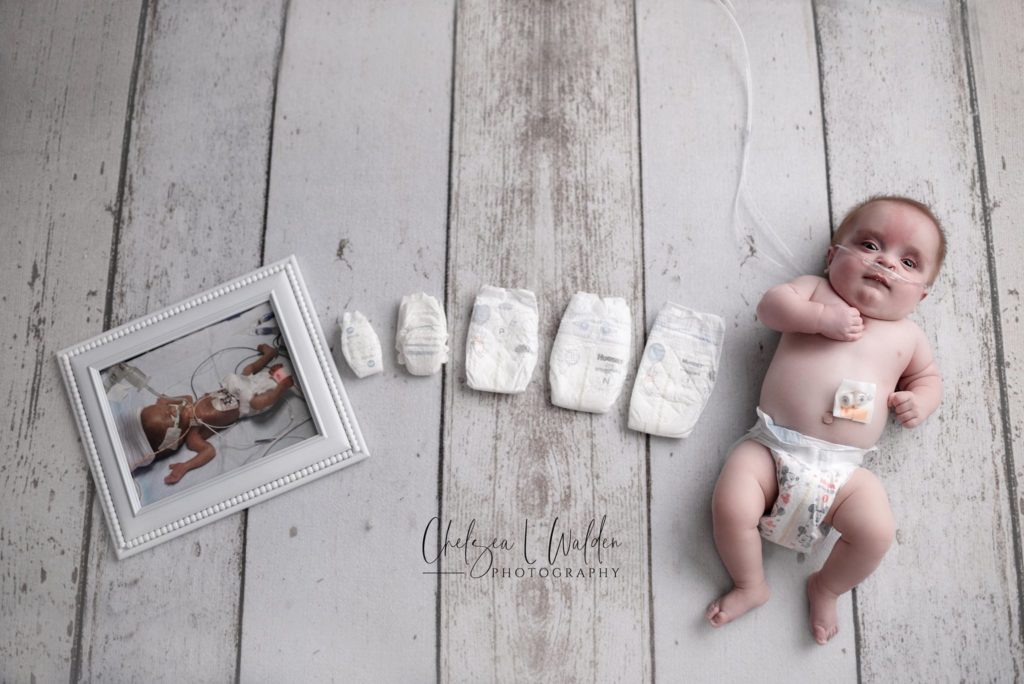


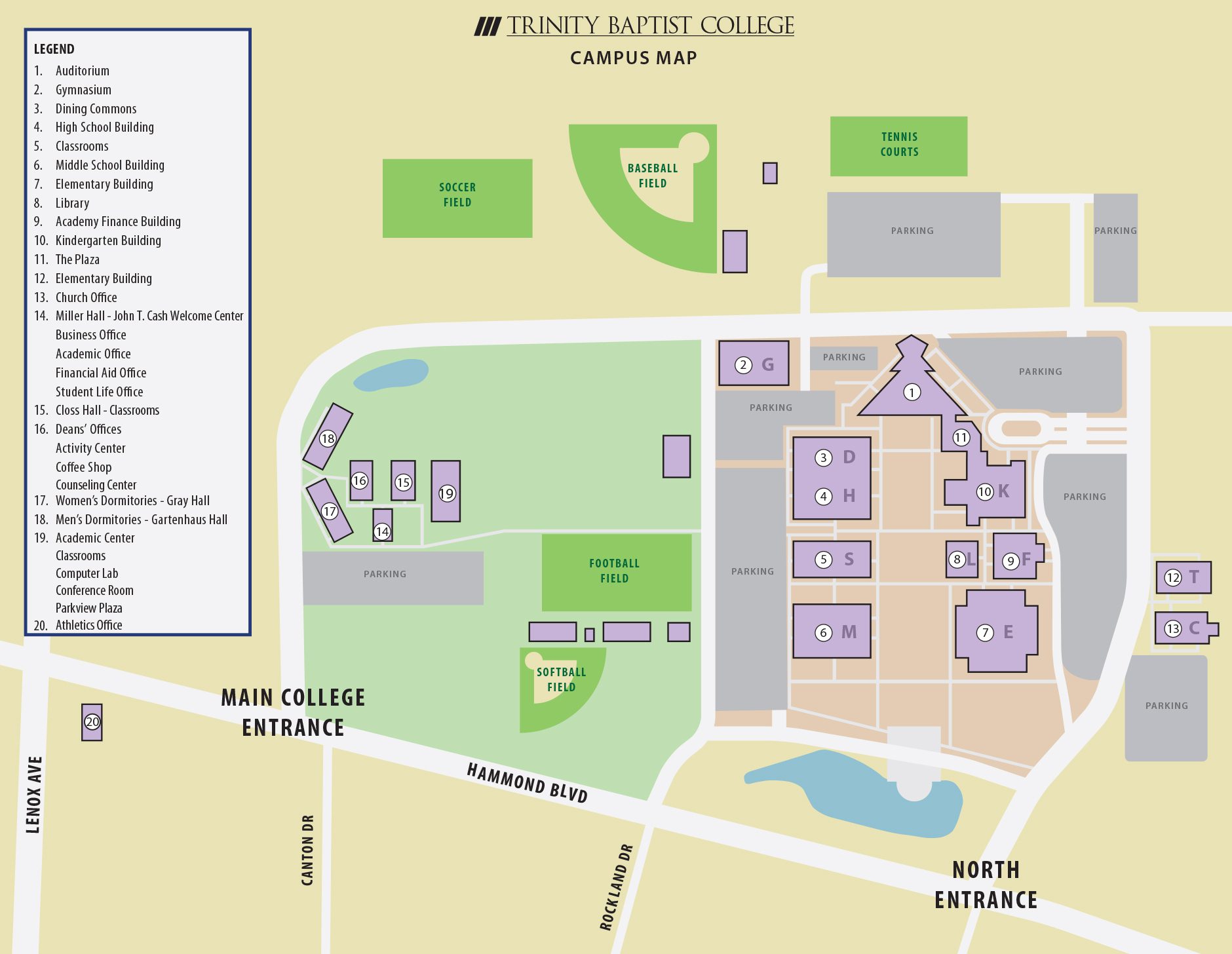





Leave a Reply